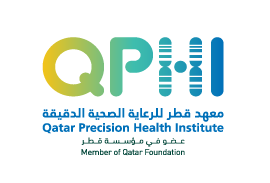
 QPHI Research Consortium (QPHRC, 2nd round)
QPHI Research Consortium (QPHRC, 2nd round)
Building on the success of the consortium’s first round, this second round aims to leverage QPHI’s extensive genomic and health data for innovative studies that bridge basic research and practical applications.
This research consortium is dedicated to advancing both basic and translational research, with a strong emphasis on implementing findings that directly benefit clinical and public health outcomes.
Note: Submissions are now closed for this call.
Please visit the following link for the list of QPHRC approved projects.
| Reference Number | Application Title | LPI Name | Institute |
|---|---|---|---|
| QPHI-RES-PUB2-00001 | Using Big Data to Improve the Health of Patients with Cardiovascular Diseases in Qatar | Prof. Fadwa Alhalaiqa | QU |
| QPHI-RES-PUB2-00002 | Decoding the CHIP puzzle. Unveiling Phenotype-Genotype Dynamics for Disease Prevention Strategies | Dr. Amna Gameil | HMC |
| QPHI-RES-PUB2-00004 | Insulin resistance subtypes and modulation of CVD risk in the Qatari population | Dr. Ilhame Diboun | Sidra |
| QPHI-RES-PUB2-00005 | Development of AI-based multi-ancestry profile using multi-omics dataset for autoimmune diseases | Dr. Rozaimi Mohamad Razali | QU |
| QPHI-RES-PUB2-00006 | The Genetic Landscape of Neurodegenerative Disorders in the Qatari Population- Leveraging Qatar Precision Health Institute Data | Prof. Omar El-Agnaf | HBKU |
| QPHI-RES-PUB2-00007 | Association of Rare Variants in Protein-Coding and Long Non-Coding RNA Genes with Cardiometabolic Traits and Cancer | Prof. NEAHD ALAJEZ | HBKU |
| QPHI-RES-PUB2-00008 | Telomere Sequence Analyses across People of Different ancestries in Qatar: Unveiling the Association between Genetic Determinants of Telomere Length and Cancer | Dr. Lotfi Chouchane | WCMQ |
| QPHI-RES-PUB2-00009 | The Metabo Regulatory Role of the satellite sequences in the Qatari Population | Prof. Karsten Suhre | WCMQ |
| QPHI-RES-PUB2-00010 | Building and benchmarking the performance of Qatar Genome-derived Nucleotide Foundation Models | Dr. Rajat Thomas | WCMQ |
| QPHI-RES-PUB2-00011 | Investigating LRP1, LRP4, and LRP8 Variants and Mutations in the Qatari Population: Implications for Disease Associations and Genetic Diversity | Dr. Noor Al-Maslamani | HBKU |
| QPHI-RES-PUB2-00012 | Unraveling the Genetic Basis of Sitosterolemia and Atherosclerotic Cardiovascular Disease: The Roles of ABCG5, ABCG8, and LPA Genes—Pharmacogenetic Perspectives on Statins, PCSK9 Inhibitors, Ezetimibe, and ANGPTL3 Inhibitors | Prof. Georges Nemer | HBKU |
| QPHI-RES-PUB2-00015 | Multimodal AI-based Analysis of Genomics, Medical Imaging, and Electronic Medical Records in the Middle East: Insights from the Qatar Precision Health Institute Dataset | Dr. Mohamad Saad | HBKU |
| QPHI-RES-PUB2-00016 | Identifying Mutation-Driver Genes in Cancer Using Qatar Biobank Cohort | Dr. Ajaz Ahmad Bhat | Sidra |
| QPHI-RES-PUB2-00019 | The genetic etiology of reproductive disorders in women and men in Qatar | Dr. Matteo Avella | Sidra |
| QPHI-RES-PUB2-00021 | Investigation of Reproductive Genetics in Qatar | Dr. Mashael Al-Shafai | QU |
| QPHI-RES-PUB2-00023 | Genetic Investigations of Inherited Heart Diseases in Qatar | Dr. Kholoud Al-Shafai | Sidra |
| QPHI-RES-PUB2-00024 | Mapping rare and common genetic factors underlying neurodevelopmental psychiatric disorders in QBB | Prof. Younes Mokrab | Sidra |
| QPHI-RES-PUB2-00026 | An integrative Multi-Omics analysis for identifying Metabolic Syndrome biomarkers in Qatar Biobank participants | Dr. Waleed Aamer | Sidra |
| QPHI-RES-PUB2-00030 | PRISM - Precision Health through Pharmacogenomics, AI and Systems Medicine | QPHI | QPHI |
| QPHI-RES-PUB2-00036 | The Qatar Genome 25K Study - Enabling Genetic Discoveries in the Middle East | QPHI | QPHI |
The Qatar Genome Research Consortium (QGP Publication strategy, 1st round)
Overview
In 2016/2017, Qatar Genome assembled the QGP Research Consortium (QGP-RC), which was divided into 10 main studies working on fundamental genetic analyses that were never addressed at this scale in an Arab population using whole genome data. The consortium included over 150 members of local researchers and their international collaborators.
The QGP-RC published several key publications in high impact journals providing foundational results that would fill a much-awaited literature gap on the genomics of Qatari and Arab populations.
Please click the Link to view the list of publications from the first round of the consortium

